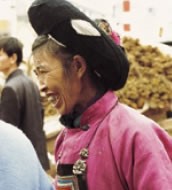Lawu in China

Photo Source:
Copyrighted © 2026
Operation China, Asia Harvest All rights reserved. Used with permission |
Send Joshua Project a map of this people group.
|
| People Name: | Lawu |
| Country: | China |
| 10/40 Window: | Yes |
| Population: | 26,000 |
| World Population: | 26,000 |
| Primary Language: | Lalo, Dongshanba |
| Primary Religion: | Ethnic Religions |
| Christian Adherents: | 0.20 % |
| Evangelicals: | 0.02 % |
| Scripture: | Portions |
| Ministry Resources: | No |
| Jesus Film: | No |
| Audio Recordings: | No |
| People Cluster: | Tibeto-Burman, other |
| Affinity Bloc: | Tibetan-Himalayan Peoples |
| Progress Level: |
|
Introduction / History
Even though the Yi minority in China is comprised of more than 100 tribes and subgroups speaking numerous languages and dialects, some of these groups share common historical roots. Many Yi (and some Hani) believe a man named Zzemuvyvy (Zhongmuyu in Chinese) was their original ancestor. Zzemuvyvy and his six descendants are referred to in Yi manuscripts from as far as Sichuan to southern Yunnan and Guizhou provinces.
Although they have been officially classified as part of the generic Yi nationality in China, the Lawu are a distinct ethnolinguistic group. They have never before been listed in any ethnographic survey of China's people groups and, therefore, have never been on any mission lists of China's unreached peoples either. The Lawu are culturally and linguistically different from three other similarly named Yi groups in Yunnan: the Awu, the Laluo, and the Lalu.
What Are Their Lives Like?
Every five days (on days 5, 10, 15, 20, 25, and 30 of each month), the Lawu from Shuitang District in Xinping County come down from the mountains to trade with the Tai and Han living in the Gasa River Valley.
What Are Their Beliefs?
For countless generations the Lawu have adhered to the superstitions of animism, polytheism, and ancestor worship. Their belief system reveals itself in a number of different ways. One example is Mi Ga Ha, which in the Lawu language is the "Dragon Worship Festival." During the second lunar month, a day is chosen for all villagers to gather around a large tree and hold a ceremony to worship the dragon. They believe the dragon is responsible for rainfall and many other natural phenomena. They hope to appease the dragon in order to quell floods and prevent drought. At the same time many other Yi people celebrate the Torch Festival, the Lawu observe a day of worshiping their ancestors.
There are a handful of Christians among the isolated Lawu people. They are not considered resistant to the gospel but have simply never heard it. Paul Vial, a French Catholic missionary among the Sani in the late 1800s, held great hopes for all Yi groups becoming Christian, especially because of their belief in Creation and the Universal Flood. He wrote, "Christianity ... will make them understand what is beautiful, good, and true, and the [Yi] will no longer think to search elsewhere for that which he will find henceforth in himself."
What Are Their Needs?
Without the guidance of Christ, these people are like sheep without a shepherd. They need the good shepherd in their families and communities.
Prayer Points
Pray for the Lord to thrust out faithful workers.
Pray for the Lord to intervene in their families, calling people to his side.
Pray for their hearts to be drawn to the Lord of lords.
Pray for a church planting movement to thrive in their communities.